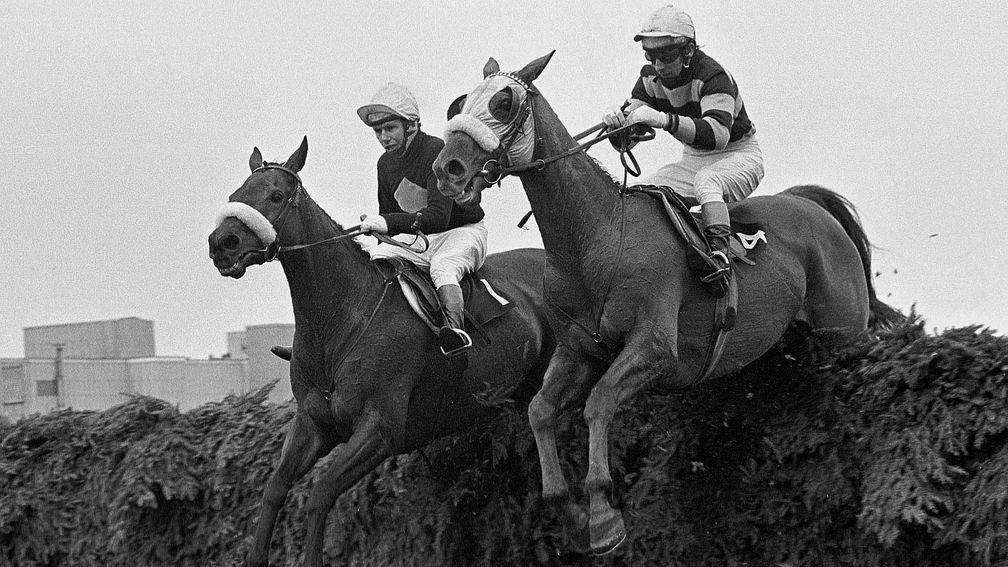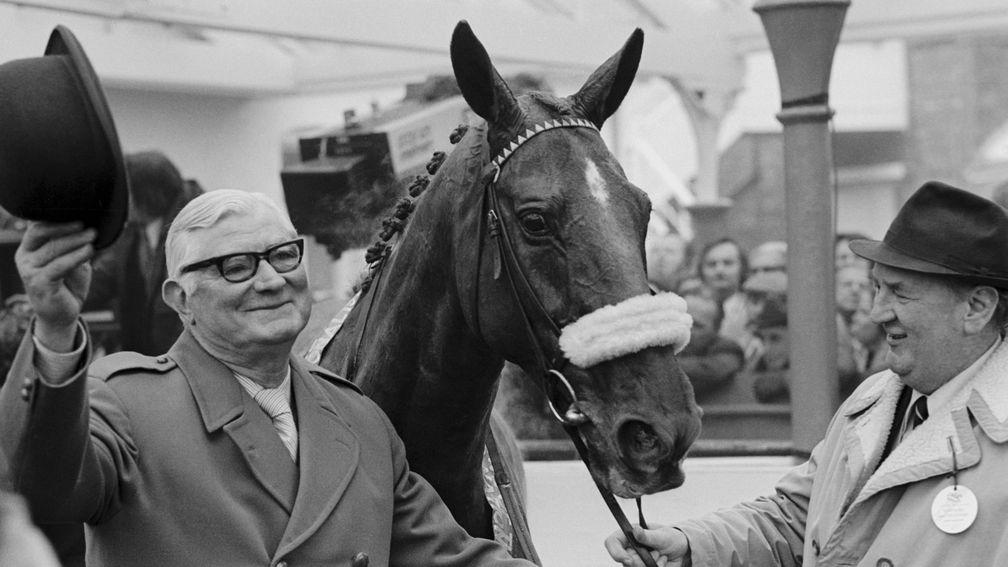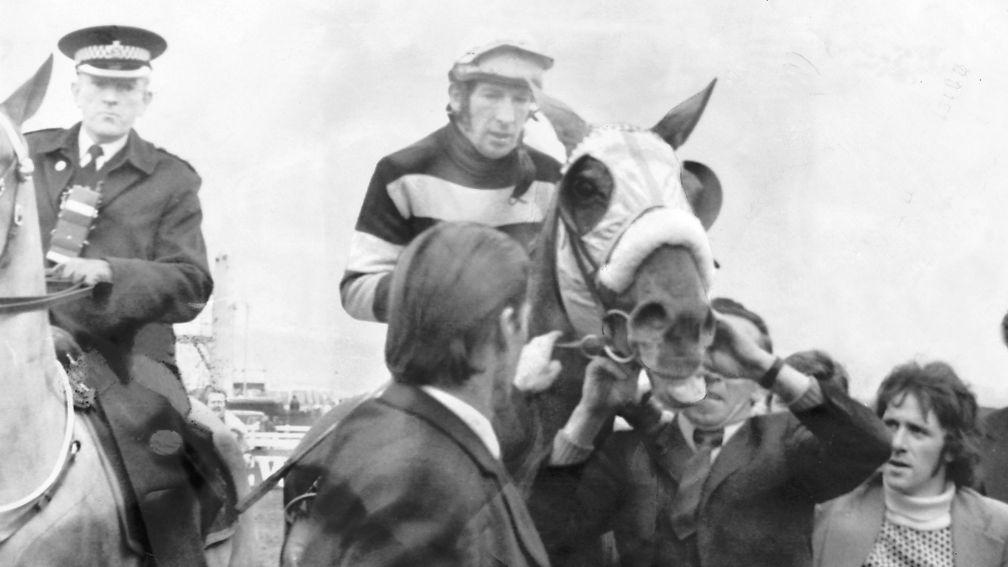Horse of a lifetime: the story of Carberry's greatest partner L'Escargot

In a piece first published in the Racing Post on March 31, 2015, Steve Dennis recounts the story of L'Escargot, the horse with whom Tommy Carberry will be forever associated
Some snail, this. L'Escargot was swift enough to win a Gloucestershire Hurdle (Supreme Novices'), classy enough to win two Cheltenham Gold Cups, durable and honest enough to be placed in two Grand Nationals before winning the great race 40 years ago.
So if recognition for the big chestnut with the little white star is occasionally, inexplicably unforthcoming, it's hardly his fault. Only two horses have won the Gold Cup and Grand National – Golden Miller and L'Escargot, yet his name is rarely mentioned when the highest praise is passed around. The record books remember even if people forget.
"I do think he's always been a bit underappreciated," says Arthur Moore, assistant trainer to his father Dan while L'Escargot bestrode the first half of the 1970s.
"His name doesn't come up that often, does it? "He was very tough, a very sound horse, and he looked after himself a little bit, which probably helped him last as long as he did."
L'Escargot was owned by Raymond Guest, Winston Churchill's cousin and the US ambassador to Ireland, whose chocolate and pale blue hooped silks had already been carried to Derby glory by the Vincent O'Brien-trained Larkspur and Sir Ivor. Only two owners had previously won both the Derby and Grand National, and Guest was determined to be the third.
"He'd been trying to win the National for years and had sent my father several horses for that purpose, but none of them were much good," remembers Moore. "One day my father told him 'instead of buying one to win it, you already have one in the yard who might'. That was L'Escargot."
The gelding's pedigree hinted at such promise, he being out of a half-sister to 1958 National winner Mr What. Speed was initially his forte though – he was well backed by Guest to win his bumper, ridden by subsequent Classic-winning trainer Ben Hanbury – and on his first visit to the Cheltenham Festival he won the second division of the Gloucestershire Hurdle under habitual partner Tommy Carberry.

L'Escargot's next visit to Cheltenham was in the 1970 Gold Cup, in which he was an unconsidered outsider despite having shown decent form in preparation. The hot favourite, an Arkle-elect running in Himself's yellow and black colours, was Kinloch Brae, but he fell at the third-last and 33-1 chance L'Escargot stayed on up the hill better than French Tan to win by a length and a half.
"I'd had a bet with Timmy Hyde [Kinloch Brae's jockey] before the race. He thought he'd win and I thought I'd win, so we bet a bottle of beer on it," says Carberry, 73, his delight undimmed by distance. "He fell but we'd have beaten him anyway. And his second Gold Cup was easy, no problems."
It may seem perverse to whistle through the rarity of a second Gold Cup victory, but it was in truth a moderate renewal denuded for various reasons of all its stars bar L'Escargot,
However, the bid for the holy grail hat-trick was beset by problems. L'Escargot went winless through the season – perhaps his inconsistency is one reason for his relative lack of recognition – and struggled at home.
"Everything went wrong," says Moore. "He had problems with a foot – he was normally relatively easy to train but that was just a bad season. It was the year that Mr Guest had cameras following him around, which was typical luck." Carberry concurs. "He went off the boil," he says. "In the Gold Cup he was running down his fences, he just wasn't happy at all."
L'Escargot finished fourth in that Gold Cup, and fourth again in the next. "He was getting a bit clever by then," murmurs Moore, echoing his notion that L'Escargot knew how to look after himself. In any case, by that stage the focus had shifted to Aintree – although L'Escargotwould run twice more at the festival it would only be as a sighter for the main target of the Grand National. Yet his first experience of the big fences, as 17-2 favourite less than a month after losing his Gold Cup crown, could not have been less encouraging.
"He didn't seem to like the place," says Carberry. "We didn't last very long – something got in his way at the third fence and he dropped me.
"I thought the experience would put him off, but Dan Moore sent him back there the following October and we had a bit of a school round, he jumped very well to be second. After that he was fine with the place."
The following year L'Escargot tried again, but in a two-horse race he was no better than best of the rest, almost in the same parish as Crisp and Red Rum but as much a spectator as those in the grandstands. "He stayed on from Becher's second time, kept on very well, and at least he'd got round," says Carberry, accentuating the positive.
With L'Escargot now showing at least a vague affinity for the National, Moore altered his Cheltenham plans before the 1974 renewal, missing the Gold Cup in favour of the less attritional Cathcart Chase, in which he finished runner-up over a trip by now well short of his best. At Aintree he was equipped with blinkers – regarded then as much more of a rogue's badge than they are now, and possibly another contributing factor to his lack of public appeal – and was 24lb better off with Red Rum than in the previous season. "The blinkers were just to keep his concentration steady," says Carberry. "He wasn't ungenuine, but if something drastic had been going on around him he'd have got himself well out of it."
But for all L'Escargot's efforts he couldn't lay a glove on the greatest Aintree horse of all time. He was within three lengths of Red Rum going to the second-last but the leader simply rolled his shoulders and skipped clear, leaving L'Escargot treading water. Three strikes at Aintree - and out? Carberry thought so.
"We were on the plane back to Ireland, and I was thinking we'd never win the race. But Dan said that he'd keep him fresh next season, everything aimed at Aintree. Twelve months later we were back, and by then I thought we could win it."
The build-up to the 1975 Grand National was dominated by two topics – Red Rum, and whether he could win the race for an unprecedented third time, and the future of the race itself, and whether it had one. In that era there were several 'last Grand Nationals', and Aintree's new owner Bill Davies seemed to care little about the race other than for its potential as a money-maker. With the general gaiety of the occasion diluted by the ongoing uncertainty, and ticket prices tripled, the smallest crowd in memory turned up to watch history being made, as it is every 12 months in this part of Liverpool.

"My father hadn't been that well, and my mother Joan had practically taken over the training," says Moore, 26 on that great afternoon. "He was there, though, able to enjoy it."
He would not have enjoyed what happened at the fence after Becher's first time round, the little fence famed for Foinavon. L'Escargot, now resplendent in pale blue blinkers to match Carberry's cap, hit the fence very hard and almost sent Carberry into orbit. There is a photograph that shows L'Escargot with his head down and Carberry's backside pointing to the sky, his face in L'Escargot's mane, his feet out of the irons. A feather's touch either way and he'd have gone, but Carberry stayed on.
"It didn't put him off, it woke him up!" says Carberry gleefully. Moore reckons it was only the fact that Carberry had bridged his reins that kept him aboard. "L'Escargot was an economical jumper, just got from one side of a fence to the other," adds Moore. And so he did, just.
A circuit later – the dice having rolled L'Escargot's way again at the fence before Becher's, when he sidestepped the sprawling liability High Ken with the elan of a prima ballerina – the race was developing inevitably into a duel between the two old foes. Southern Quest and Glanford Brigg were on the premises, The Dikler was about to slip out of the back door, but Red Rum was going strongly in third and L'Escargot, loping along with an action that would never win rosettes but proved thoroughly suited to the mud, was fifth.
At the fourth-last Southern Quest blundered and Red Rum went on, but L'Escargot was only – only – cantering, Carberry with his hands on the withers as though they were still going down to the start. Three out and it was the big two alone. A few strides after the third-last Carberry angled L'Escargot towards Red Rum, took a long look over his right shoulder, and took a pull on the reins. L'Escargot was, at last, at the age of 12, with all those hard miles in his legs, simply running away.
"I didn't want to go on," says Carberry, and down the crackling phone line there is a sense of his old eyes all agleam, the years coming off him with every word. "L'Escargot liked company, liked to follow a horse.
"Brian Fletcher shouted across to me 'go on then Tommy, you've won a minute', but I wasn't going anywhere. He was happy enough where he was; I was happy."
On the run to the second-last Carberry looked over his right shoulder again, like an outlaw checking on the posse, and on Red Rum poor Fletcher went desperately for his whip, like a caught mouse waiting for the cat to lose patience with the game, waiting for the end to come.
Carberry, with all the time in the world, sat still. He wanted a lead over the last, and Red Rum gave it to him. As they landed Fletcher turned his head again towards Carberry, but his words went with the wind. Carberry squeezed his heels into L'Escargot and squeezed the life out of Fletcher's faint hopes, and sprinted clear.
"He hacked up," says Carberry. "He hacked up," says Moore. And so he did. The margin was 15 lengths, and if that meant L'Escargot was the villain of the piece for beating darling Red Rum then Moore couldn't have cared less.
"In the winner's enclosure I put my trilby between his ears as I always did, as I always have done," he says. "There was a party that night in the Adelphi, and Raymond Guest's daughter Virginia stood on a chair and read out a telegram from Bruce Hobbs, who had won the 1938 National on Battleship with father in second place on Royal Danieli.
"The telegram went 'sorry you didn't ride a National winner, but I'm delighted that you trained one - Bruce'. Wasn't that a nice thing to send?" L'Escargot ran but once more, ending his career with second place in the Kerry National, whereupon a peeved Guest, who after Aintree had made a present of the horse to Joan Moore, thinking that his racing days were done, snatched him back and took him to the US, where he died at the age of 21.
Carberry, four times champion in Ireland, rode very many good horses, including triple Irish National winner Brown Lad, who he calls "a proper steed". The lyricism of that description doesn't attach itself to L'Escargot - for Carberry, he was simply "a very good horse". As an epitaph it will do fine; L'Escargot's other epitaph is in the history books, unfading over the years.
Gold Cup winner, Grand National winner. L'Escargot's name will live forever.
THE LOWDOWN
Name L'Escargot
Pedigree Chestnut gelding, born in 1963 by Escart III out of What A Daisy
Owner Raymond Guest
Trainer Dan Moore
Jockey Tommy Carberry
Big-race wins Cheltenham Gold Cup (1970, 71), Grand National (1975), Gloucestershire Hurdle (1968), Wills Premier Chase (1970) Cheltenham Festival record 16114425
Grand National record U321
Published on 12 July 2017inObituaries
Last updated 20:04, 12 July 2017
- Mark Bradstock: the small-scale trainer who defied the odds to win jump racing's ultimate prize
- Grace, charm, style and knowledge - vibrant Maureen Mullins provided the DNA for Irish racing
- An irrepressible character with a ready wit: Alan Sweetman reflects on the life of Tommy Kinane
- Edward Hide: a supreme tactical judge with an unblemished record of integrity and honesty
- Lady O'Reilly: gracious and cosmopolitan host whose love for horses was genuine and rooted in a lifelong passion
- Mark Bradstock: the small-scale trainer who defied the odds to win jump racing's ultimate prize
- Grace, charm, style and knowledge - vibrant Maureen Mullins provided the DNA for Irish racing
- An irrepressible character with a ready wit: Alan Sweetman reflects on the life of Tommy Kinane
- Edward Hide: a supreme tactical judge with an unblemished record of integrity and honesty
- Lady O'Reilly: gracious and cosmopolitan host whose love for horses was genuine and rooted in a lifelong passion